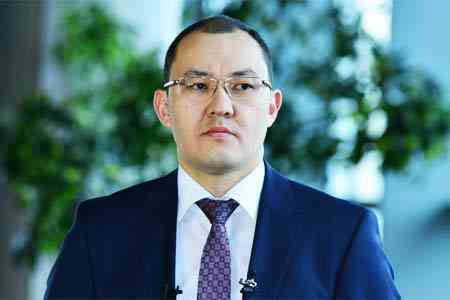


ArmInfo.The signing of a peace treaty between Armenia and Azerbaijan is very important, as is the establishment of diplomatic relations between these countries. Asset Assavbayev, Secretary-General of TRACECA told reporters today, on the sidelines of a Ministerial Meeting of Landlocked Developing Countries, answering a question about blocking access to the seas by Azerbaijan and Turkey.
According to the TRACECA Secretary General, the platform presented today is economically oriented and there are other formats for discussing policy-related issues. "We are looking forward to the signing of a peace treaty, which will allow us to unblock transport communications, and this, in turn, will have a positive impact on both the economies of Armenia and Azerbaijan, as well as the economies of other states in the region," the TRACECA Secretary General noted.
He added that landlocked countries, including Armenia, have much higher transport costs, which are often twice the costs of landlocked countries when trading with other countries. Therefore, to solve this problem, a format approved by the UN is used, which is aimed at creating equal trading conditions with coastal countries. "Thus, 33 states, including both Armenia and transit states providing transit of goods and vehicles, undertake to implement the UN Vienna Program aimed at creating the necessary mechanisms to simplify trade, accelerate the transit of goods and vehicles and eliminate barriers," Assavbayev emphasized, pointing out in this regard the importance of this platform for all countries that do not have direct access to the sea.
TRACECA Secretary General emphasized that the main agreement, which was signed 25 years ago, is aimed at developing trade and transport links. TRACECA resolves these issues within the framework of its powers by harmonizing transport policies, removing barriers when crossing borders, and creating legal conditions. For example, an agreement on a single transit permit within the TRACECA framework is currently being promoted, according to which transit countries should provide access to the sea to countries that do not have such access, which means refusing to obtain transport permits in each individual country. The issue of border crossing rules is also on the agenda.
On December 14, a two-day Ministerial Meeting of Landlocked Developing Countries, entitled "Promoting equal, affordable and inclusive transport connectivity for stable and resilient economies", kicked off in Yerevan. This is one of the largest events ever organized in Armenia jointly with the UN.
The event is a formal thematic meeting organized ahead of the Third Conference of Landlocked Developing Countries (LLDCs) to be held in Kigali in June, 2024. The event is attended by more than 30 foreign delegations, including representatives of landlocked developing and transit countries, in particular, the Ministers of Foreign Affairs of Botswana and Nepal, the Ministers of Transport of Zimbabwe, Eswatini and Lesotho, the Minister of Tourism of Malawi, the Deputy Ministers of Foreign Affairs of Paraguay and Georgia, Deputy Ministers of Transport of Tajikistan, Kazakhstan, Turkmenistan. The event is also attended by representatives of international organizations, such as UN Uder Secretary-General and High Representative for Landlocked Developing Countries Rabab Fatima, Executive Secretary of the UN Economic Commission for Europe Tatiana Molchan, TRACECA Secretary General Asset Assavbaev, Deputy Director General of the World Trade Organization. The Secretaries General of Economic and Social Commissions of UN Africa, as well as UN Asia and the Pacific, the World Customs Organization and the Black Sea Economic Cooperation will deliver video messages.